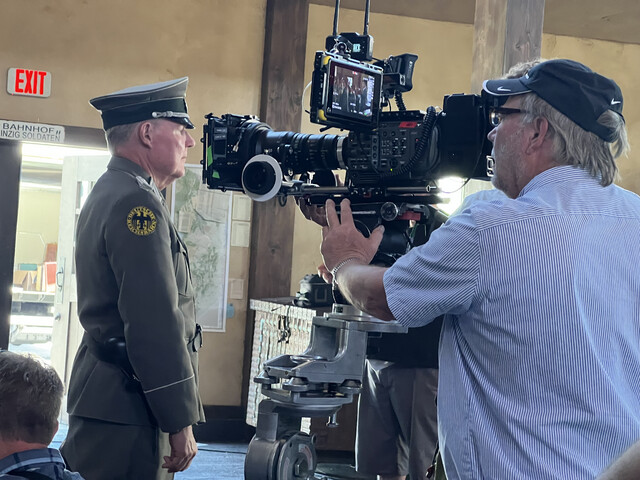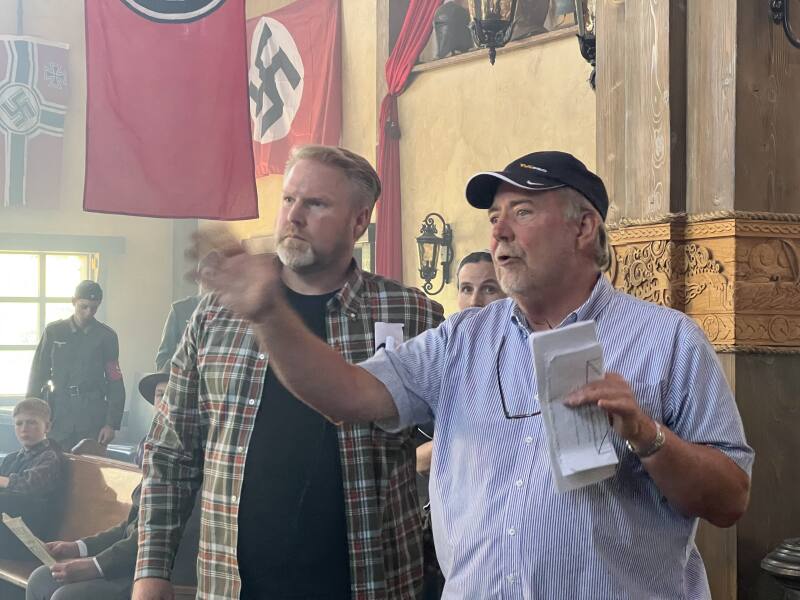In August 1939, as Hitler’s army was closing borders, 79 American missionaries were serving in Germany—and needed to get out. Their escape is one of the most dramatic events in modern Church history. A new movie, Escape from Germany, tells their story.
We recently talked to the film’s director, T.C. Christensen, about his career and experiences making the movie.
What is one of your favorite movies to watch?
If I’m down to choosing just one, I’m going to tell you Fiddler on the Roof. The scenes of Tevye struggling to balance change and accepting some amount of change, and the way he talks to God throughout the day, the music—I just think it’s a masterpiece.
What gave you the courage to pursue freelance film as a career?
I think maybe you should ask what gave me the stupidity to pursue it. But the answer is that I had inspiring parents. There are 10 kids in my family, and my parents were very good at teaching us that we could accomplish whatever we wanted. Because of them, I thought to myself, “You know what? Maybe I have it in me, so let’s get ’er going.”
How did you encounter the story of missionaries escaping Germany before World War II?
Nine or ten years ago, someone sent me Terry Montague’s book about the story. I read it and thought it had terrific things in it that would make a great film. But I didn’t know how I could pull it off. When you walk down the hall at a multiplex theater, you’re passing films that cost, I’d say, between 30 million and 200 million dollars. Our films have to be made for under a million dollars.

With this film, I’d need 1939 trains and train stations and old cars and on and on! It’s a very expensive idea. So I didn’t pursue it.
Years later, one of my business partners wrote me, reminding me what a good story it is, and I wrote back and told him all the reasons it cost too much. I hit send on the email but immediately started thinking, “Well, I’ll bet I could save a lot of money if I did this or that.” And I got hooked on trying to figure out a way to make it work.
Do you think the Holy Ghost helps guide your work?
I hope so. Filmmaking, like most jobs, is mostly a lot of hard work, a lot of sweat and perseverance, and what I call stickity-to-ity. But I feel like there are times when I have an idea or a problem to surmount, and it just all of a sudden is like, “Hey, here’s what you need to do.”
What was it like on set during this film?
Ninety-five percent of the extras in this film are descendants of the actual missionaries who escaped. I love to have them on the set. We introduced them to the cast and crew every morning, and they made me cry every morning because they’re there to honor their ancestor, and they bring a spirit to the set that helps us remember that we are telling a real and important story.
Parts of the movie were filmed in Budapest. What was that experience like?
It’s a lovely city, and it had the two things I really needed—great train stations and a great period train. One challenge was that we had trouble getting our money into the country. It was supposedly taken care of ahead of time, but then it wasn’t, and the production company in Budapest wouldn’t let us shoot without the money first. We were frustrated and didn’t know what to do. We went to church on Sunday in Budapest, and one of the people we talked to had served a mission in Budapest and was there visiting, just that one Sunday. He overheard us talking about the trouble and stepped in to help. It took just a few hours and boom—we had the money in the country. If we wouldn’t have met him, we would not have gotten the shots that we needed. It was a miracle.

What is it about filmmaking that still captivates you?
Film combines all of the other arts: music, theater, art, dance, and literature. And I think because it has all of the art disciplines involved, film is the most powerful storytelling tool that there is. We have so many great stories in the history of the Church and in our culture that I would never run out of great stories to tell. Movies can make a difference. Movies matter—and the movies that matter the most are the movies that make people realize they matter. I’m still very zippity about trying to make that kind of a movie.
Escape from Germany will be available in select theaters beginning April 11.
▶You may also like: A new film about missionaries’ daring WWII escape is coming—read 3 miracles behind the movie


